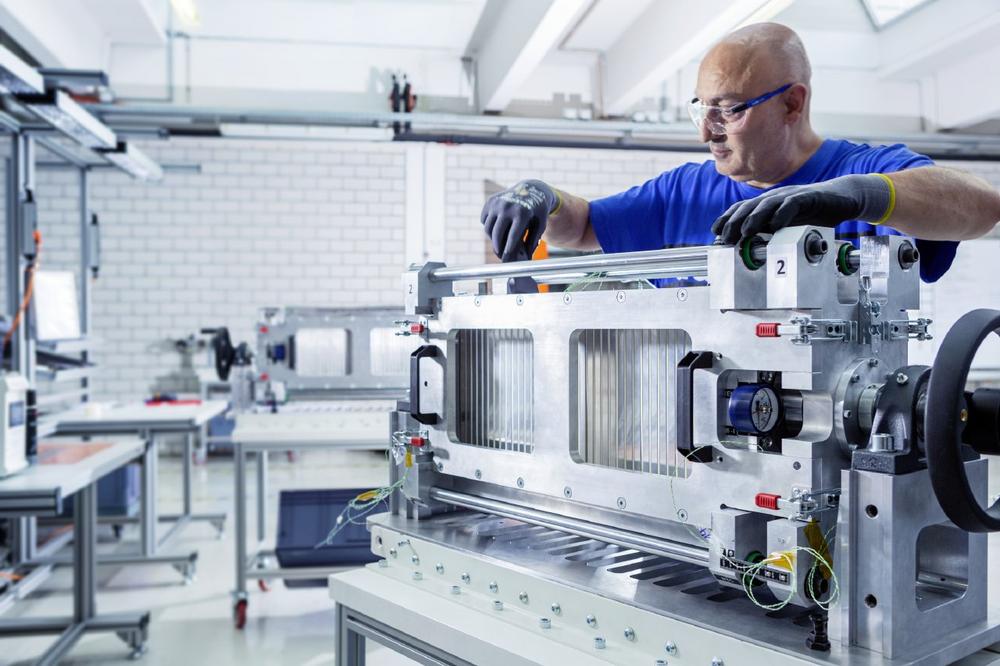Direct Recycling of lithium-ion batteries is a unique recycling process in that it preserves the important crystal structure of the cathode material. Farasis has now been able to successfully demonstrate that recycled cathode material can be recovered from whole used cells or battery manufacturing scrap and then integrated into new cells. Farasis has shown that cells containing up to 25 percent recycled cathode material can exhibit equivalent performance to cells made from pure virgin cathode material. The Direct Recycling process thus makes it possible to significantly reduce the usage and quantity of new cathode active material without compromising the performance of the newly produced batteries. At the same time, it contributes to a more environmentally friendly and sustainable method of cell manufacturing while reducing the overall CO2 footprint. "Our goal is to develop a closed-loop value chain of the battery throughout its lifecycle – from design to end of life management," says Dr. Keith Kepler, CTO and co-founder of Farasis. "We have made significant progress toward this goal with the validation of our direct recycling process."
More than 10 years of research and development in battery recycling
Farasis Energy is a pioneer in research and development for Direct Recycling of lithium-ion batteries. As a leading supplier of innovative lithium-ion battery technology and pouch cells for electric mobility, Farasis has been working for more than 10 years to make lithium-ion battery manufacturing more environmentally friendly and sustainable. Recent advances in its Direct Recycling process development will enable Farasis to implement highly efficient, economically feasible recovery of the most valuable active materials from cells, batteries and battery manufacturing scrap. Farasis’ ongoing commitment to developing its recycling technology has led to two U.S. patents and multiple research grants, including a $1.76 million development contract awarded by the United States Advanced Battery Consortium (USABC).
Recycled cathode powder for reuse in electric vehicle battery cells
Modern batteries for electric vehicles contain a high proportion of NCM cathode materials, which typically accounts for 40 percent of the costs; “NCM” refers to the metals nickel, cobalt, and manganese. Most commercial recyclers of lithium-ion batteries focus on either high-temperature smelting or chemical dissolution of the carefully-engineered cathode material, and recovering only the individual metals. These recycling techniques are energy intensive and impart a significant negative impact to the environment. The Direct Recycling process, on the other hand, enables direct and complete recovery of the high-grade cathode material in its original crystalline form. And that means: the active material for cathodes is recovered intact and can be used directly again in the production of new lithium-ion cells. Farasis‘ environmentally friendly Direct Recycling process thus eliminates the need for costly and energy-intensive re-synthesis of the cathode material from its basic components.
High demands on electrochemical excellence
In developing its Direct Recycling process, Farasis Energy placed a special focus on the performance of the recycled cathode material. This is because the production of new lithium-ion cells using active material for cathodes recovered from used cells has one prerequisite: that the cells containing recycled cathode powder have comparable characteristics and performance to those made from strictly virgin materials. Farasis has now demonstrated that up to 25 percent recycled cathode powder can be used in new lithium-ion cells without significantly impacting performance. Internal testing and external validation of sample 2Ah cells by a US-DOE National Laboratory have shown that even after 600 charge/discharge cycles the cells containing recycled cathode continue to perform similarly to their pristine counterparts. The next step is to validate certain cathode recycling process capabilities on a much larger scale, with the aim of enabling Farasis to begin recycling the cathode electrode scrap that is produced during cell manufacturing.
Farasis Energy is a developer and producer of high-performance lithium-ion battery technology and pouch cells for electric mobility and other power storage applications. Founded in California in 2002, the company now operates research and development centers in China, Germany and the USA. There are currently two production facilities in Ganzhou and Zhenjiang (China) with a current total capacity of 21 GWh/a. A third production facility with a targeted capacity of 24 GWh/a is currently under construction in Wuhu (China). A fourth production facility is under construction as a joint venture with Togg in Gemlik, Turkey. Besides Togg, Farasis Energy’s major strategic partners also include companies such as Daimler and Geely.
Farasis Energy
21363 Cabot Blvd
USAHayward CA 94545
Telefon: +49 (0)7022 789 4484
https://en.farasis.com
Telefon: + 49 7022 / 789 4411
E-Mail: press@farasis.com
![]()

